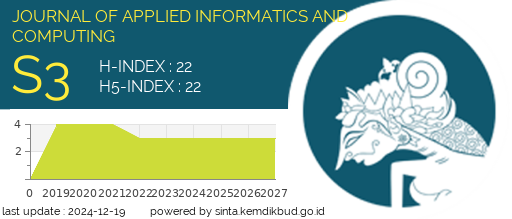Game-Based Learning for Mathematics Lesson on 3rd Grade Elementary School
DOI:
https://doi.org/10.30871/jaic.v9i1.8661Keywords:
Game-Based Learning, Mathematics Education, 3rd Grade Elementary School, Mathematics GameAbstract
Integrating cutting-edge strategies to improve students' learning experiences has become increasingly important in the ever-changing world of education. This study investigates how third-grade students at SD Pius Purbalingga can benefit from using game-based learning as an instructional strategy to improve their mathematical education. The study focuses on how to hold children' attention and improve their knowledge of mathematics. The main subject of this study is the effectiveness of educational games in enhancing elementary school student's understanding of mathematics. A mathematics game was created to solve this problem by actively involving pupils and reiterating key mathematical ideas. This game-based strategy aimed to create an engaged and enjoyable learning experience for third-grade pupils with acceptable cognitive capacities. The findings suggest that students who played the math game significantly increased their involvement, comprehension, and memorization of mathematical ideas. This study adds to the growing evidence supporting using educational games as useful tools in mathematics instruction. The study's findings revealed increased academic performance among students, with male students experiencing a rise of 2.4% in their overall scores. In contrast, female students demonstrated a significantly higher increase of 8.5%, indicating a more pronounced advancement in their academic performance.
Downloads
References
Y. Alpian and S. W. Anggraeni, "Pentingnya Pendidikan Bagi Manusia," Jurnal Buana Pengabdian, vol. 1, no. 1, pp. 66"“72, 2019.
D. E. Kurniawan, A. Dzikri, H. Widyastuti, E. Sembiring, and R. T. Manurung, "Smart mathematics: a kindergarten student learning media based on the drill and practice model", J. Phys. Conf. Ser., vol. 1175, p. 12037, Mar. 2019.
E. Nazri, A. Azmar, and N. Neliwati, "Komponen-komponen Kurikulum Sekolah Dasar," EDUKATIF : Jurnal Ilmu Pendidikan, vol. 4, no. 1, pp. 1289"“1298, Jan. 2022, doi: 10.31004/edukatif.v4i1.2160.
R. Maisaroh, R. Siregar, and I. Dewi, "Peran Matematika Dalam Kehidupan Sosial Masyarakat," 2022.
Anisa Vitriana Indofah and Cahyo Hasanudin, "Anggapan Siswa Tentang Pelajaran Matematika yang Sulit dan Menakutkan," 2023.
M. Prensky, "Digital Game-Based Learning The Games Generations: How Learners Have Changed," McGraw-Hill, 2001.
H. Fakultas, K. Dan, and I. Pendidikan, "Strategi Pemanfaatan Game Online Dalam Mendidik Anak Usia Dini," 2022.
Dinda Anjelika Noveladia, Ruslan Majid, and Syawal Kamiluddin Saptaputra, "Hubungan Kecanduan Dan Durasi Bermain Game Online Dengan Kualitas Tidur Pada Remaja Di Kelurahan Kassilampe Tahun 2022".
D. Nurlita et al., "Systematic Literature Review: Pemanfaatan Game Edukasi Digital sebagai Media Pembelajaran Biologi di SMA," Jurnal Edukasi Nonformal, vol. 4, no. 1, 2023.
A. Cinta, P. Wibawa, H. Q. Mumtaziah, L. A. Sholaihah, and R. Hikmawan, "Game-based learning (gbl) sebagai inovasi dan solusi percepatan adaptasi belajar pada masa new normal," 2021.
A. Astriyana, F. C. Wiseza, and I. Ibermarza, "Meningkatkan Hasil Belajar Matematika Menggunakan Model Pembelajaran Game Based Learning," SALAM: Jurnal Sosial dan Budaya Syar-i, vol. 10, no. 3, pp. 995"“1004, Jul. 2023, doi: 10.15408/sjsbs.v10i3.33923.
F. Ayu Maulidina, "Media Permainan Matematika untuk Meningkatkan Minat Belajar Anak Usia 5-6 Tahun," Jurnal Studi Guru dan Pembelajaran, vol. 7, no. 2, 2024, doi: 10.30605/jsgp.7.2.2024.4410.
J. G. Z. Mambu, D. H. Pitra, A. R. M. Ilmi, W. Nugroho, N. V Leuwol, and A. M. A. Saputra, "Pemanfaatan Teknologi Artificial Intelligence (AI) Dalam Menghadapi Tantangan Mengajar Guru di Era Digital," Journal on Education, vol. 06, no. 01, pp. 2689"“2698, 2023.
Y. Marryono Jamun, "Dampak Teknologi Terhadap Pendidikan," Pendidikan dan Kebudayaan Missio, vol. 10, no. 1, pp. 48"“52, 2018.
K. Pendidikan and D. Teknologi, Matematika Kelas 3 SD. 2022. [Online]. Available: https://buku.kemdikbud.go.id
S. Liza Zahara, Z. Ula Azkia, and M. Minan Chusni Program Studi Pendidikan Fisika UIN Sunan Gunung Djati Bandung, "Implementasi Teknologi Artificial Intelligence (AI) dalam Bidang Pendidikan," Penelitian Sains dan Pendidikan, vol. 3, no. 1, pp. 15"“20, 2023, [Online]. Available: https://e-journal.iain-palangkaraya.ac.id/index.php/mipa/
S. V. Lidianto, G. Satia Budhi, and R. Intan, "Perancangan dan Pembuatan Action Game dengan Artificial Intelligence dan Machine Learning."
Syahbudin and Kafriansyah, "Pengujian Efektivitas dan Efesiensi Sistem Informasi Berbasis Web dan Penggunaan Aplikasi Excel," Teknik Elektro UNISMUH, vol. 14, no. 1, pp. 7"“11, 2022.
P. Yoko, R. Adwiya, and W. Nugraha, "Penerapan Metode Prototype dalam Perancangan Aplikasi SIPINJAM Berbasis Website pada Credit Union Canaga Antutn," 2019.
I. N. Rachmawati, "Pengumpulan Data Dalam Penelitian Kualitatif: Wawancara," Keperawatan Indonesia, vol. 11, no. 1, pp. 35"“40, 2017.
A. Surya Winata, H. Sidik Iriansyah, and E. Oktaviana, "Pengembangan Media Komik Gambar Grafis pada Pelajaran Pendidikan Kewarganegaraan Materi Hak dan Kewajiban Masyarakat".
Downloads
Published
How to Cite
Issue
Section
License
Copyright (c) 2025 Miquel Jan Tanudidjaja, Caraka Aji Pratama, Bernadhed .

This work is licensed under a Creative Commons Attribution-ShareAlike 4.0 International License.
Authors who publish with this journal agree to the following terms:
- Authors retain copyright and grant the journal right of first publication with the work simultaneously licensed under a Creative Commons Attribution License (Attribution-ShareAlike 4.0 International (CC BY-SA 4.0) ) that allows others to share the work with an acknowledgement of the work's authorship and initial publication in this journal.
- Authors are able to enter into separate, additional contractual arrangements for the non-exclusive distribution of the journal's published version of the work (e.g., post it to an institutional repository or publish it in a book), with an acknowledgement of its initial publication in this journal.
- Authors are permitted and encouraged to post their work online (e.g., in institutional repositories or on their website) prior to and during the submission process, as it can lead to productive exchanges, as well as earlier and greater citation of published work (See The Effect of Open Access).











